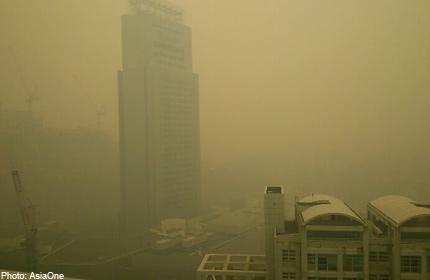
INDONESIA - As ministers from five Asean countries prepared to meet on Wednesday to discuss the haze issue, Indonesian officials and forest campaigners said Jakarta has to get its act together on three fronts.
The Asean meeting in Kuala Lumpur was brought forward to this week after forest fires in Sumatra blanketed Singapore and parts of Malaysia with thick haze last month.
Indonesian authorities are being urged to commit to completion of the One Map initiative.
This aims to mark all forest boundaries and concessions clearly on one official map, which will improve transparency and accountability, and also minimise land disputes.
Second, the authorities should cut through confusing and overlapping regulations by assigning clear responsibilities for law enforcement.
Third, they should adopt a carrot-and-stick approach towards farmers and companies whose slash-and-burn method of clearing land gives rise to the haze.
The suggestions are not exactly new but getting them off the ground has taken on a new urgency since last month's haze.

The One Map initiative, for instance, has been around since late 2010 when President Susilo Bambang Yudhoyono called for different maps being used by the National Agency for Land Administration, Forestry Ministry and Agriculture Ministry to be integrated.
| Haze in Singapore & Malaysia Click on thumbnail to view (Photos: ST, TNP, The Star, AFP, Reuters) |
||||
 |
 |
 |
 |
 |
 |
 |
 |
 |
 |
 |
 |
 |
 |
 |
 |
 |
 |
 |
 |
 |
 |
 |
 |
 |
 |
 |
 |
 |
 |
 |
 |
 |
 |
 |
 |
 |
 |
 |
 |
The idea is also to allow government officials and non-governmental organisations to synchronise the land data they have and update them on a single map available online for all parties to check against. But it is not an easy task.
"It is a live map being filled in by everyone... and sometimes not updated even if there are changes... so this is not easy," Forestry Minister Zulkifli Hasan told The Straits Times in May.
Still, backed by satellite images of hot spots and fires, an integrated map can help pinpoint whose land is being torched so that officials can go after the culprits.
As of last year, the Forestry Ministry estimated there were some 2,500 cases in which land- owners breached the terms of their licences, such as clearing land for mining or plantations without proper approval.
Mr Agus Purnomo, the presidential adviser on climate change, is seeking a legal review to put the burden of responsibility on concession holders or district chiefs, regardless of whether the fires were started by them.
"If there is a fire on your concession land and you are unable to put it out within a week, you will lose your licence," he told The Straits Times.
"Similarly, if you are a district head and you have, say, 10 hot spots that continue for a week, we will send you to jail. But if you don't assign responsibility and back it with sanctions, you end up with a blame-game."
Forest campaigner Peter Holmgren calls for "more public investment in fire-monitoring, prevention and firefighting, and more education to make sure there is an understanding of the consequences of burning".
"Some things that need to be in place are beyond just law enforcement," said Dr Holmgren, director-general of the Centre for International Forestry Research.
Mr Riko Kurniawan, chief of the Riau chapter of the Indonesian Forum for the Environment, said banks can play a part by demanding proof of zero-fires before granting loans to plantation firms.
Incentives, such as rewarding districts that have no fires with a bigger budget, should be also considered.
The time has come to act, says Mr Riko. "This is a man-made disaster... it can be solved. The question is, will it be done, and when?"
zubaidah@sph.com.sg


